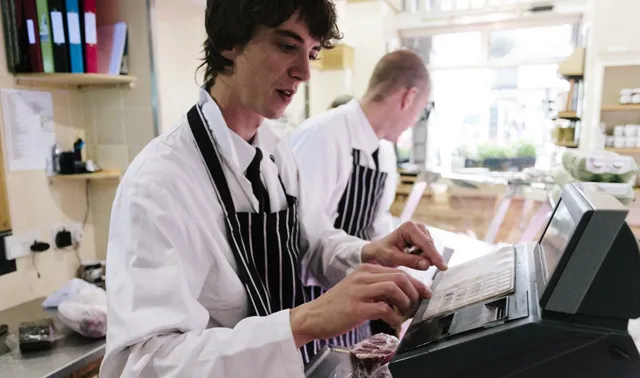Inflation has fallen to its lowest level in two-and-a-half years, driven largely by slowing food price rises.
Prices rose by 3.2% in the year to March, down from 3.4% the month before, according to official figures.
The cost of some items including meat, crumpets, chocolate biscuits, furniture and household items fell. However, petrol and diesel prices rose.
Lower inflation does not mean prices overall are coming down, they are just rising less quickly.
While the overall rate of inflation has dropped, goods in the shops are still much more expensive than they were two years ago.
Meat prices, driven by a drop in the cost of pork, fell by 0.5% between February and March, compared with a rise of 1.4% a year ago.
Prices for furniture and household goods like cleaning products also fell by 0.9% in the year to March.
Soaring food and energy bills have been the main causes behind the UK’s high inflation in recent years.
Inflation has been falling gradually since it peaked at 11.1% in late 2022, driven by the aftermath of Covid when demand for goods rose sharply after factories struggled to cope with the rise in demand.
Oil and gas were also in greater demand after the pandemic, and prices surged again when Russia invaded Ukraine, cutting global supplies. The conflict also reduced the amount of grain for sale, pushing up food prices.
It led to inflation for food and non-alcoholic drinks hitting almost 20% last year – the highest level seen since the 1970s.
The rate of inflation in March was slightly higher than economists expected, but experts said that was unlikely to change expectations that the Bank of England will cut interest rates this year, potentially as early as June.
Yael Selfin, chief economist at KPMG UK, said it expected inflation to return to its 2% target later this spring, “which raises the prospect of interest rate cuts from June onwards”.
Chancellor Jeremy Hunt described the latest official figures as “welcome news”.
He said that due to lower inflation and the government’s recent cut in National Insurance for the employed and self-employed, which came into force on 6 April, “people should start to feel the difference as well as see it in their pay cheques”.
However, Rachel Reeves, Labour’s shadow chancellor said working people would still feel worse off.
“Prices are still high in the shops, monthly mortgage bills are going up and inflation is still higher than the Bank of England’s target,” she said.








